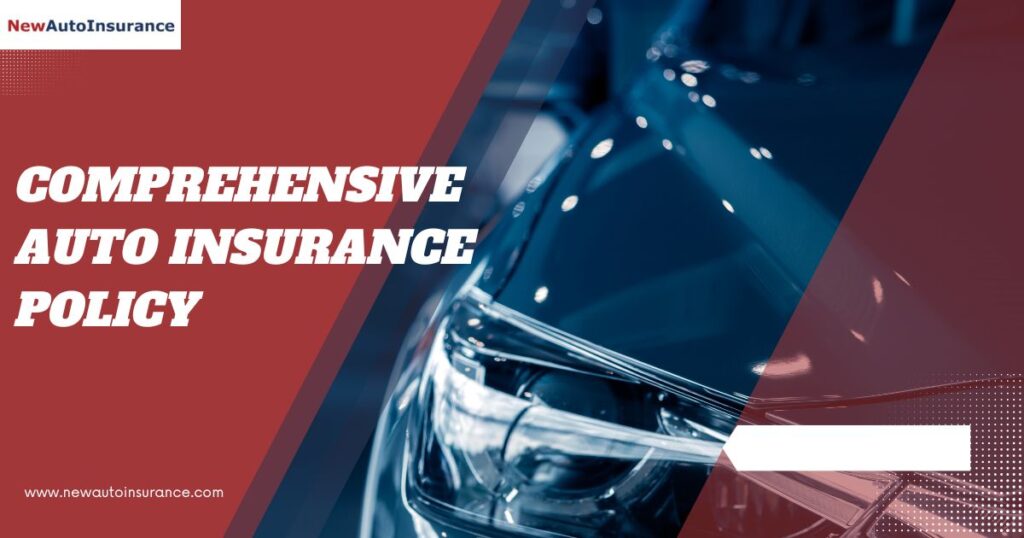Car insurance is a necessity for anyone who owns or operates a vehicle. It provides financial protection in an accident, theft, or unexpected incident. With so many auto insurance policies available, choosing the right one can be overwhelming. In this guide, we will go over what to look for in a comprehensive auto insurance policy to ensure you have the coverage you need.
What is a comprehensive auto insurance policy?
A comprehensive auto insurance policy covers many events, including theft, vandalism, fire, weather-related damage, and collisions with animals. It also covers medical expenses and liability in the event of an accident.
What to look for in a comprehensive auto insurance policy:
- Liability coverage: It is a requirement in most states and provides financial protection in the event you cause an accident that results in property damage or injury to another person.
- Collision coverage: Collision coverage provides protection against damage to your vehicle in the event of a collision with another vehicle/car or object, regardless of who is at fault.
- Comprehensive coverage: With comprehensive insurance, you are covered for things like theft, vandalism, and natural disasters that don’t involve an accident.
- Medical payments coverage: The medical payments coverage of an insurance policy will pay for any medical bills that are incurred as a direct result of an accident, regardless of who was to blame for the incident.
- Personal injury protection: Personal injury protection provides coverage for lost wages, medical expenses, and other expenses incurred as a result of an accident.
- Uninsured/underinsured motorist coverage: This coverage provides coverage in the event you are in an accident with someone who doesn’t have insurance or doesn’t have enough insurance to cover the damages.
- Roadside assistance: Roadside assistance provides coverage for services such as towing, flat tire changes, and jump-starts in the event of a breakdown.
- Rental car reimbursement: After an accident, if you have rental car reimbursement, you will be covered for the cost of a rental automobile while your own vehicle is being repaired.
- Discounts: Many insurance providers offer discounts for safe driving, multiple vehicles, and bundling policies.
Pros of a comprehensive auto insurance policy:
- Comprehensive coverage provides protection for a wide range of events.
- Medical payments coverage and personal injury protection provide coverage for medical expenses and other expenses incurred as a result of an accident.
- You will be protected by uninsured/underinsured motorist coverage in the event that you are involved in an accident with another person who does not have insurance or who does not have enough insurance to cover the damages caused by accident.
- Roadside assistance and rental car reimbursement provide additional convenience and peace of mind.
Cons of a comprehensive auto insurance policy:
- Comprehensive coverage may be more expensive than other types of auto insurance.
- Adding additional coverage, such as medical payments, personal injury protection, and rental car reimbursement, can also increase the cost of the policy.
How to choose the right auto insurance policy for you:
- Determine your coverage needs: Consider your budget, driving habits, and your vehicle’s value to determine the coverage level you need.
- Compare rates: Make sure you’re receiving the greatest bargain on insurance by comparing quotes from multiple companies.
- Consider customer service: Look for insurance providers with good customer service ratings and a reputation for handling claims quickly and efficiently.
- Review discounts: Review available discounts and see if you qualify for any, such as safe driving or multiple policy discounts.
- Read reviews: Read reviews from other customers to get an idea of the quality of service the insurance provider provides.
Conclusion
Choosing a good car insurance policy is an important decision that requires careful consideration. A comprehensive auto insurance policy protects a wide range of events, but it may also be more expensive than other types of auto insurance. When choosing an auto insurance policy, consider your coverage needs, and compare.
FAQs
What is a good car insurance policy?
A good car insurance policy provides adequate coverage for your needs at a price you can afford. This typically includes liability coverage, collision coverage, comprehensive coverage, and any additional coverage options you may need.
What should I consider when choosing a car insurance policy?
When choosing a car insurance policy, consider your coverage needs, budget, the insurance provider’s reputation, available discounts, and the quality of customer service.
Is it important to compare rates from different insurance providers?
If you shop around and compare auto insurance quotes from a number of different providers, you can save money on your coverage. It is important to get quotes from multiple providers and compare coverage options and prices to ensure you get the best value.
What types of discounts are available for car insurance policies?
Insurance providers may offer discounts for safe driving, multiple vehicles, bundling policies, and other factors. It is important to ask about available discounts and see if you qualify for any to help reduce the cost of your policy.
How do I go about filing a claim with my auto insurer?
If you find that you need to make a claim on your auto insurance policy, you should get in touch with your insurance company as soon as possible and provide them with all of the information they require. Be prepared to provide information about the incident, any damage or injuries, and any other relevant details. The insurance provider will work with you to process the claim and provide any necessary support.
Visit our website NewAutoInsurance.com to learn more.


